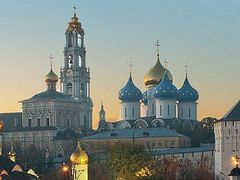The sermons of the well known priest Mikhail Boiko († 2002), a respected pastor and spiritual father, were enormously popular among Kievans and pilgrims who came to the Pokrov Convent in Kiev, where Fr. Mikhail served for over thirty years. During the soviet era, when the Kiev Caves Lavra was closed and there were only slightly more than ten parishes open in Kiev, the grandiose St. Nicholas Cathedral—the main edifice in the convent (the convent was founded in the late nineteenth to early twentieth centuries by St. Anastasia—Alexandra Petrovna Romanova)—held over two thousand people with difficulty. Fr. Mikhail’s sermons were taped and transcribed. Over 200 of them are gathered in the book, May Your Hearts Not Be in Doubt,1 published by batiushka’s spiritual children after his repose in 2006. Fr. Mikhail’s sermons were characterized by his childlike simplicity, accessibility, spiritual depth, and wisdom.
 M. V. Nesterov. St. Sergius at work.
M. V. Nesterov. St. Sergius at work.
In the name of the Father, and the Son, and the Holy Spirit!
St. Alexei, Metropolitan of Moscow and wonderworker of All Russia, when perceiving his impending departure from this world to the next, began to ponder this question: To whom should he pass on the hierarchical throne of Moscow and All Russia? And his gaze rested upon the best successor, a holy man, Father Sergius, the wonderworker of Radonezh. He went to him with this proposal and wanted to place his hierarchical cross upon him, but was unexpectedly met with the word: “From my youth I have not been a wearer of gold, and especially in my old age I want to remain poor. You won’t find what you are looking for in me, for I am a sinful man and worse than all people.” And these were the words of a man who was worthy for his holy life to receive from God the gift of clairvoyance, the gift of healing; and he even raised a youth from the dead. He was worthy to be visited by the Mother of God and the apostles Peter and John the Theologian. And this man considered himself worse than everyone in the world!
So, beloved brothers and sisters, let us turn our attention to the venerable one’s words, spoken from a pure heart. And let us ask ourselves: Why did he call himself the worst of all people? Because even in his youth, when he planned to leave the sinful world and go to the forest hermitage, he heeded the words of the Lord in the Holy Gospels: Blessed are the poor in spirit, for theirs is the Kingdom of Heaven (Matt. 5:3); and he strove all his life to attain this spiritual poverty. As we see, hear, and are convinced, he truly attained it.
What is this spiritual poverty, brothers and sisters? What is meant by that concept? It is first of all the awareness of oneself as a good-for-nothing and sinful person, an “unprofitable servant”, as the Lord Jesus Christ teaches (Lk. 17:10). For only such a spiritual awareness forms an insurmountable barrier to the most destructive human passion—pride, which is the main obstacle on the spiritual path to the Kingdom of Heaven.
Therefore, as we have come to God’s church on the commemoration day of the saint to honor the great ascetic of Christ, we naturally would want to be vouchsafed the crown that our holy father Sergius of Radonezh received. He has inherited the Kingdom of Heaven.
What hinders us from receiving this Kingdom? We are hindered by the lack of this very spiritual poverty, the lack of awareness that we are the most sinful of all people. Although we might pronounce those words at times and say, “I am the worst of all people,” only one encounter of simply even some unfavorable circumstances is enough to convince us that this is not so. It is very easy to test it. As soon as some one close to us says an unkind word to us, criticizes us, or points out some personal fault of ours, our soul immediately feels insulted and flares up with resentment. This is a clear sign that we do not have an awareness of our sinfulness. And if we see that some one we know has been given more respect and attention than us, and this wounds us, then this is likewise testimony to the fact that we are far from spiritual poverty, that the spirit of pride reigns in us. And if we look with contempt and arrogance at our impoverished brothers who sit with outstretched hands or dig in the garbage bins, or consider those who do not go to church and are not of the Christian faith to be worse than ourselves and judge them, this also tells us that we do not have spiritual poverty.
 The St. Nicholas Cathedral in the Pokrov Convent (Kiev), where Fr. Mikhail Boiko served and preached for over 30 years.
The St. Nicholas Cathedral in the Pokrov Convent (Kiev), where Fr. Mikhail Boiko served and preached for over 30 years.
Our venerable father Sergius of Radonezh has given us a great spiritual lesson by calling himself the “worst among people”, meaning worse than both those who worship God, and those who are indifferent to God and do not want to know the Creator and Savior of the world. He was like the Gospel publican who beat his breast with the words, “God, be merciful to me a sinner!” (Lk. 18:13), and said the Jesus prayer all his life, with the awareness of his poverty, exclaiming, “Lord Jesus Christ, Son of God, have mercy on me a sinner!” The saint learned through experience the spiritual law that it is not ascetic labors that open the way to salvation, but first of all humility and purity of spirit. They call down God’s mercy upon us.
And we see that the Lord had mercy on the saint for his spiritual poverty and gave him what he longed for all his life; He gave him the Kingdom of Heaven. And not only that. The Lord gave incorruption to his temporal body, which even after a half a century is still before our eyes. And the Lord gave him the power of healing; even after his death, he gives healing through his body of all illnesses, of both soul and body, to whomever runs to him with faith and love for help. The Lord gave St. Sergius the glory of a luminary and miracle worker before the whole world, a protector and guardian angel of the Russian land!
So, beloved brothers and sisters, this is what it means to accept into our hearts the Lord’s words about spiritual poverty, what it means to strive to receive this poverty with all our strength. May St. Sergius’s teaching on spiritual poverty become a seed in our hearts and produce fruit, so that we might become poor in spirit and hear the words of our Lord Jesus Christ: Come, ye blessed of my Father, inherit the kingdom prepared for you from the foundation of the world (Mt. 25:34).




